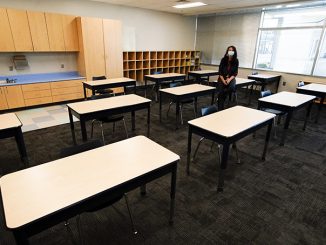RALEIGH — Nine criminal complaints were filed on Nov. 30 with the Wake County Sheriff’s Office over what parents say are obscene and pornographic books in Wake County Public Schools libraries.
The complaints were all filed separately, with one being filed by Julie Anne, the of the Wake County chapter of Moms for Liberty. Another one of the complaints was filed by Wendy Runyon, the committee chair handling the book investigation for the Wake County Moms for Liberty.
Anne tells North State Journal that her group saw lists of books parents had been objecting to in different areas and on social media and they decided they needed to look at the books for themselves.
Runyon turned in a list of 24 books that included some text examples from the books and what Wake County schools they have been found in. Additionally, Runyon gave the Wake County Sheriff’s Office (WCSO) over 30 pages of photos of pages from the books on the list.
At least three of the books, “George, “Gender Queer,” and “Lawn Boy,” overlapped with the complaints filed by another parent, Beatrice Setnick. Anne said she had never met Setnick before the parents converged on the WCSO.
“We [Moms for Liberty] are not calling for firing of public librarians and principals,” said Anne. “That’s just not what we’re about.”
Anne said what her group wants is for a determination to be made if the books in question are illegal to have in public schools.
“Are they [the 24 books] in violation of any statutes?” asked Anne. “And if they violate statute, then they should automatically come out because of obscene content – sexually explicit and obscene.”
She also said if the books are found legal to be in schools, that her group is calling for “some type of verification or required parental review of these titles” and “express written consent” from parents for their kids to check out those titles.
Anne said her group is concerned with transparency and parental rights.
“Our group is all about parent choice and parent rights,” Anne said. “We are not about banning books. We are not about censoring books. This is about letting parents know what is in the libraries.”
“While some people may think all of that material is fine to be available to children, there are others who think it is not fine it’s readily available to children,” said Anne. “Parents should have that final say and determination on what type of material their child can see.”
According to the WCPSS policy manual, Policy Code 3200 covers “Selection of Instructional Materials.” The policy indicates the “responsibility for the selection of media collection materials is delegated to professional media personnel under the direction of the principal.”
Anne said one district official told her that book selection is specific to each individual school.
With regard to content of the books, Anne said the books also include very explicit language, rape, incest, pedophilia, bestiality. Additionally, she said some of the books have sexual-related illustrations.
North State Journal obtained copies of the complaints, but the forms are devoid of any detail beyond the criminal code being applied and filer information. The criminal codes across the complaints included “Pornography – Selling / Distributing 2520,” “Pornography – All Other 2590,” “Sex Offense – All Other 179.” and “All Other Crimes – *must Describe in Narrative* 2690.”
Anne said her group wasn’t using the term “pornography” because that is not what her group is talking about with regard to the books. She said the books do involve “sexually explicit material – in any way possible – involving a human,” including heterosexual, homosexual, transgender relationships.
One North Carolina state law referred to by some groups on social media is § 14-190.1. Obscene literature and exhibitions, which overall states that it is “unlawful for any person, firm or corporation to intentionally disseminate obscenity.”
The statue defines obscenity much the way federal U.S. laws on obscenity do, where the “average person applying contemporary community standards relating to the depiction or description of sexual matters would find that the material taken as a whole appeals to the prurient interest in sex.”
Books may be protected under the other provisions of the statute, which also says the material needs to lack “serious literary, artistic, political, or scientific value” and as used is “not protected or privileged under the Constitution of the United States or the Constitution of North Carolina.”
In addition to filing a complaint with the WCSO, later that day Anne also filed an official grievance with Wake County Public Schools (WCPSS).
The grievance included district policies and state statutes Anne felt were being violated. When filing the grievance, she included WCPSS Superintendent Cathy Moore, the entire school board, the Wake County Board of Commissioners and other WCPSS officials.
“I did get a response the next day,” said Anne, adding that the district said they would be
getting back to her” but that no one has contacted her since.
The topic of the obscene books has not been dropped, at least not by the Wake County Sheriff Gerald Baker.
On Dec. 6, Baker spoke during the public comments portion of the Wake County Board of Commissioners’ regular meeting.
Baker’s comments followed those made by Cary resident James Walsh, one of the nine who submitted book complaints to Baker’s office.
“The complaint is real,” Walsh said holding up a thumb drive containing evidence of the materials. He later said that the evidence was brought to the Wake County School Board on Oct.5 and “they did nothing.”
Baker’s comment also addressed the parental complaints, and said they were “of great concern” to him.
“We are going to take that information and investigate it to the point where we can meet with our prosecutor, which is what we do from a Stop sign to a homicide,” said Baker. “We are not going to treat it any different, but at that point, there is and there are materials that is of great concern to me personally and, certainly, professionally.”
“But we’re going to do our job,” said Baker. “If the prosecutor chooses to pursue it, then we will continue to do what normally do the way we deal with these matters. So, thank you again, we appreciate it very much.”
While WCPSS has not addressed the book issue yet, it has been reported that at least seven copies of ‘Gender Queer’ were pulled by Wake County Public Libraries for review.
A few of the parents who filed the complaints did their own follow-up with an apparent impromptu visit to the Wake County District Attorney’s Office on Dec. 9. Additional copies of materials, including hard copies of a couple of the books in question, were apparently delivered at that time. The Wake County Moms for Liberty were not present.
A Dec. 12 Raleigh News and Observer article claims to have “read the books” but parents say report barely scratched the surface, especially with its analysis of Jonathan Avison’s “Lawn Boy,” which arguably one of the most objected to books.
Parents across the country have spoken out at school board meetings about the book, with one mom in Texas noting that the word “f*ck” appears 44 times and “sh*t” 41 times all before reaching page 66.
“Lawn Boy” features recollections of the narrator of being engaging in homosexual activity as early at 10 years old, in fourth grade. Explicit sexual references include the narrator reflecting back on an act of fellatio that took place “at a church youth group meeting out in the bushes.”
Both “Lawn Boy” and Maia Kobabe’s “Gender Queer” are books that have been repeatedly highlighted as sexually explicit by North Carolina Lt. Gov. Mark Robinson. Past remarks related to inappropriate sexual materials in schools made by Robinson in a church setting have been used as a means to call for his resignation by Democrats and by the LGBTQ community.
The Raleigh newspaper’s article does admit that “Gender Queer,” another one of the more objected to titles, contains at least five sex scenes and “sexually explicit” illustrations.
A couple who did not wish to be identified beyond having students in WCPSS remarked that the report had noted censorship of the F-word and N-word, which are included in the text of “All Boys Aren’t Blue.” The pair said that “if the book or a newspaper are censoring the word, how is it a decent book for a child to have?”


